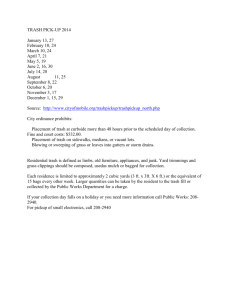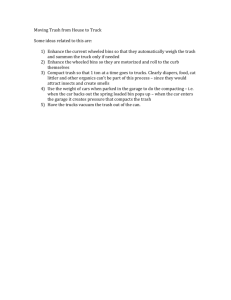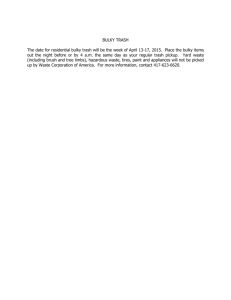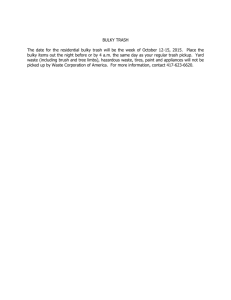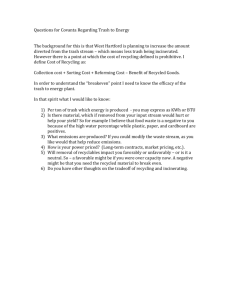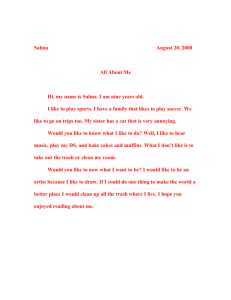Can the Arts Help to Save the World? Balance-Unbalance and
advertisement
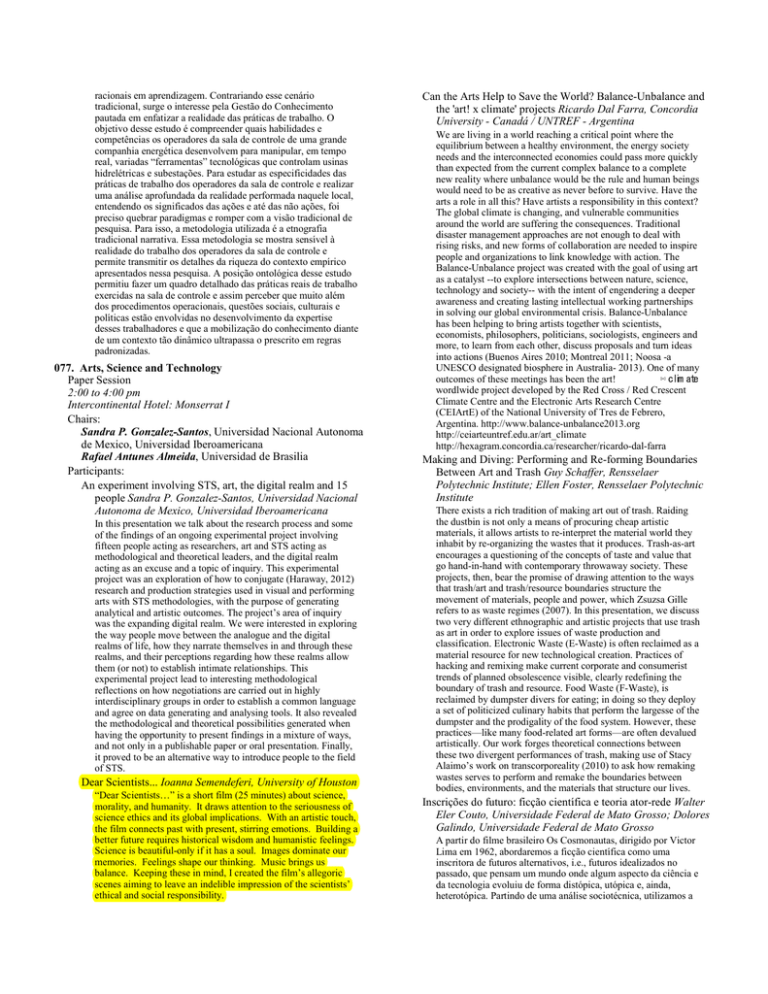
racionais em aprendizagem. Contrariando esse cenário tradicional, surge o interesse pela Gestão do Conhecimento pautada em enfatizar a realidade das práticas de trabalho. O objetivo desse estudo é compreender quais habilidades e competências os operadores da sala de controle de uma grande companhia energética desenvolvem para manipular, em tempo real, variadas “ferramentas” tecnológicas que controlam usinas hidrelétricas e subestações. Para estudar as especificidades das práticas de trabalho dos operadores da sala de controle e realizar uma análise aprofundada da realidade performada naquele local, entendendo os significados das ações e até das não ações, foi preciso quebrar paradigmas e romper com a visão tradicional de pesquisa. Para isso, a metodologia utilizada é a etnografia tradicional narrativa. Essa metodologia se mostra sensível à realidade do trabalho dos operadores da sala de controle e permite transmitir os detalhes da riqueza do contexto empírico apresentados nessa pesquisa. A posição ontológica desse estudo permitiu fazer um quadro detalhado das práticas reais de trabalho exercidas na sala de controle e assim perceber que muito além dos procedimentos operacionais, questões sociais, culturais e políticas estão envolvidas no desenvolvimento da expertise desses trabalhadores e que a mobilização do conhecimento diante de um contexto tão dinâmico ultrapassa o prescrito em regras padronizadas. 077. Arts, Science and Technology Paper Session 2:00 to 4:00 pm Intercontinental Hotel: Monserrat I Chairs: Sandra P. Gonzalez-Santos, Universidad Nacional Autonoma de Mexico, Universidad Iberoamericana Rafael Antunes Almeida, Universidad de Brasilia Participants: An experiment involving STS, art, the digital realm and 15 people Sandra P. Gonzalez-Santos, Universidad Nacional Autonoma de Mexico, Universidad Iberoamericana In this presentation we talk about the research process and some of the findings of an ongoing experimental project involving fifteen people acting as researchers, art and STS acting as methodological and theoretical leaders, and the digital realm acting as an excuse and a topic of inquiry. This experimental project was an exploration of how to conjugate (Haraway, 2012) research and production strategies used in visual and performing arts with STS methodologies, with the purpose of generating analytical and artistic outcomes. The project’s area of inquiry was the expanding digital realm. We were interested in exploring the way people move between the analogue and the digital realms of life, how they narrate themselves in and through these realms, and their perceptions regarding how these realms allow them (or not) to establish intimate relationships. This experimental project lead to interesting methodological reflections on how negotiations are carried out in highly interdisciplinary groups in order to establish a common language and agree on data generating and analysing tools. It also revealed the methodological and theoretical possibilities generated when having the opportunity to present findings in a mixture of ways, and not only in a publishable paper or oral presentation. Finally, it proved to be an alternative way to introduce people to the field of STS. Dear Scientists... Ioanna Semendeferi, University of Houston “Dear Scientists…” is a short film (25 minutes) about science, morality, and humanity. It draws attention to the seriousness of science ethics and its global implications. With an artistic touch, the film connects past with present, stirring emotions. Building a better future requires historical wisdom and humanistic feelings. Science is beautiful-only if it has a soul. Images dominate our memories. Feelings shape our thinking. Music brings us balance. Keeping these in mind, I created the film’s allegoric scenes aiming to leave an indelible impression of the scientists’ ethical and social responsibility. Can the Arts Help to Save the World? Balance-Unbalance and the 'art! x climate' projects Ricardo Dal Farra, Concordia University - Canadá / UNTREF - Argentina We are living in a world reaching a critical point where the equilibrium between a healthy environment, the energy society needs and the interconnected economies could pass more quickly than expected from the current complex balance to a complete new reality where unbalance would be the rule and human beings would need to be as creative as never before to survive. Have the arts a role in all this? Have artists a responsibility in this context? The global climate is changing, and vulnerable communities around the world are suffering the consequences. Traditional disaster management approaches are not enough to deal with rising risks, and new forms of collaboration are needed to inspire people and organizations to link knowledge with action. The Balance-Unbalance project was created with the goal of using art as a catalyst --to explore intersections between nature, science, technology and society-- with the intent of engendering a deeper awareness and creating lasting intellectual working partnerships in solving our global environmental crisis. Balance-Unbalance has been helping to bring artists together with scientists, economists, philosophers, politicians, sociologists, engineers and more, to learn from each other, discuss proposals and turn ideas into actions (Buenos Aires 2010; Montreal 2011; Noosa -a UNESCO designated biosphere in Australia- 2013). One of many outcomes of these meetings has been the art! ⋈ clim ate wordlwide project developed by the Red Cross / Red Crescent Climate Centre and the Electronic Arts Research Centre (CEIArtE) of the National University of Tres de Febrero, Argentina. http://www.balance-unbalance2013.org http://ceiarteuntref.edu.ar/art_climate http://hexagram.concordia.ca/researcher/ricardo-dal-farra Making and Diving: Performing and Re-forming Boundaries Between Art and Trash Guy Schaffer, Rensselaer Polytechnic Institute; Ellen Foster, Rensselaer Polytechnic Institute There exists a rich tradition of making art out of trash. Raiding the dustbin is not only a means of procuring cheap artistic materials, it allows artists to re-interpret the material world they inhabit by re-organizing the wastes that it produces. Trash-as-art encourages a questioning of the concepts of taste and value that go hand-in-hand with contemporary throwaway society. These projects, then, bear the promise of drawing attention to the ways that trash/art and trash/resource boundaries structure the movement of materials, people and power, which Zsuzsa Gille refers to as waste regimes (2007). In this presentation, we discuss two very different ethnographic and artistic projects that use trash as art in order to explore issues of waste production and classification. Electronic Waste (E-Waste) is often reclaimed as a material resource for new technological creation. Practices of hacking and remixing make current corporate and consumerist trends of planned obsolescence visible, clearly redefining the boundary of trash and resource. Food Waste (F-Waste), is reclaimed by dumpster divers for eating; in doing so they deploy a set of politicized culinary habits that perform the largesse of the dumpster and the prodigality of the food system. However, these practices—like many food-related art forms—are often devalued artistically. Our work forges theoretical connections between these two divergent performances of trash, making use of Stacy Alaimo’s work on transcorporeality (2010) to ask how remaking wastes serves to perform and remake the boundaries between bodies, environments, and the materials that structure our lives. Inscrições do futuro: ficção científica e teoria ator-rede Walter Eler Couto, Universidade Federal de Mato Grosso; Dolores Galindo, Universidade Federal de Mato Grosso A partir do filme brasileiro Os Cosmonautas, dirigido por Victor Lima em 1962, abordaremos a ficção científica como uma inscritora de futuros alternativos, i.e., futuros idealizados no passado, que pensam um mundo onde algum aspecto da ciência e da tecnologia evoluiu de forma distópica, utópica e, ainda, heterotópica. Partindo de uma análise sociotécnica, utilizamos a
